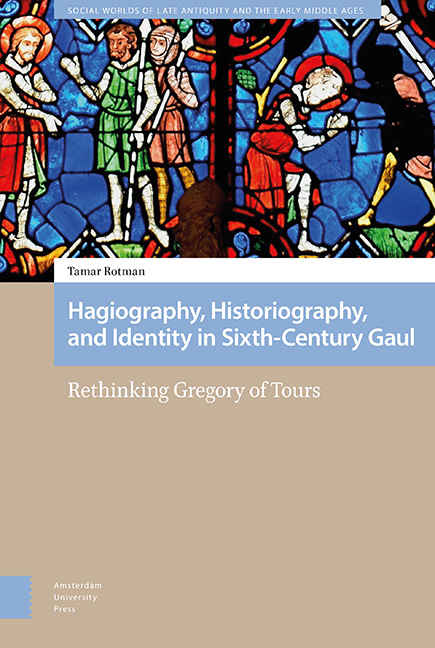Book contents
- Frontmatter
- Table of contents
- List of Abbreviations
- Acknowledgments
- Dedication
- Introduction
- 1 Gregory of Tours
- 2 ‘When the Saints Go Marching In’: Eastern Saints in Merovingian Gaul
- 3 The Miraculous History of Gregory of Tours
- 4 ‘By Romans They Refer To…’ (Romanos Enim Vocitant): History, Hagiography, and Identity
- Conclusion
- Bibliography
- Index
3 - The Miraculous History of Gregory of Tours
Published online by Cambridge University Press: 16 December 2021
- Frontmatter
- Table of contents
- List of Abbreviations
- Acknowledgments
- Dedication
- Introduction
- 1 Gregory of Tours
- 2 ‘When the Saints Go Marching In’: Eastern Saints in Merovingian Gaul
- 3 The Miraculous History of Gregory of Tours
- 4 ‘By Romans They Refer To…’ (Romanos Enim Vocitant): History, Hagiography, and Identity
- Conclusion
- Bibliography
- Index
Summary
Given that most of the eastern martyrs and saints mentioned in Gregory's Glory of the Martyrs and the Glory of the Confessors were not actually venerated in Merovingian Gaul, one may wonder why such accounts were included in these compositions in the first place. Their presence seems even more puzzling when we recall the traditional scholarly assumption that hagiographical texts were an integral part of the cults of saints, designed for use during celebrations of the saints’ feast days or to serve as a justificatory dossier for the sanctity of certain places and relics. This, however, may not be the case with Gregory of Tours's hagiographical collections.
Hagiography is a multifaceted and very useful source for the study of history. As a genre, its definition keeps changing and expanding. In the early twentieth century, Hippolyte Delehaye explained that the term should not be applied to any form of writing about saints. Rather, ‘to be strictly hagiographical the document must be of a religious character and aim at edification. The term then must be confined to writings inspired by religious devotion to the saints and intended to increase that devotion’. A century later, Felice Lifshitz questioned the entire necessity and definition of hagiography. The line connecting Delehaye's approach and Lifshitz's dismissal of hagiography as a distinct genre tells the story of hagiography as a focus of research in the past 150 years.
Delehaye's book Les Légendes hagiographiques marks a turning point in the study of hagiography. In it, Delehaye responds to contemporary scholarly discussions about the historicity of the stories – or rather legends – transmitted by hagiographical texts, which sprung from the differences between modern notions of historical truth and those of medieval authors and audiences. Nevertheless, Delehaye's contemporaries used hagiographical texts to study history, mainly by focusing on the information embedded in them on people, places, and events, while omitting anything miraculous, supernatural, or legendary. In the introduction to his book, Delehaye is straightforward about that:
Myth, tale, legend and romance all belong to the class of imaginative story, but may be divided into two categories: there are those that are the spontaneous impersonal expression of a people's genius or native disposition, and those that are the product of deliberate literary artifice.
- Type
- Chapter
- Information
- Hagiography, Historiography, and Identity in Sixth-Century GaulRethinking Gregory of Tours, pp. 101 - 128Publisher: Amsterdam University PressPrint publication year: 2021

